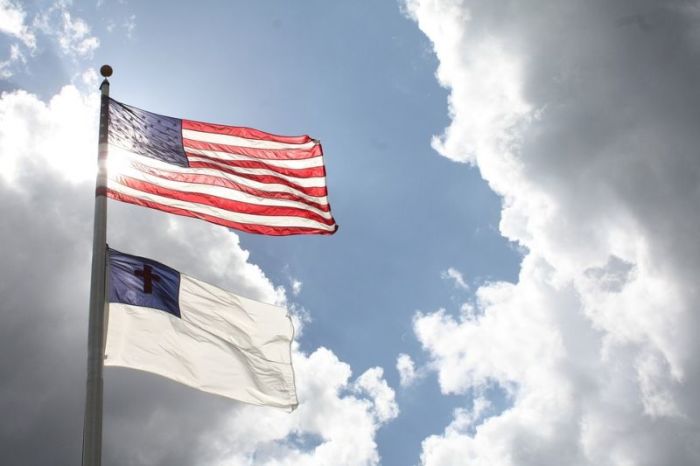Judge allows Boston to ban the flying of Christian flag outside City Hall

A federal judge ruled this week that the city of Boston, Massachusetts, does not have to raise a Christian flag at City Hall Plaza even though the city has raised flags representing other cultural and social groups, including flags indicating support for LGBT rights.
U.S. District Court Judge Denise Casper, an Obama-appointee, issued an order Tuesday denying summary judgment to a Christian man who sued the city in 2018 after the city government rejected his request in 2017 to fly a Christian flag on a public flagpole outside City Hall.
The plaintiff, Harold Shurtleff, runs the organization called Camp Constitution. Camp Constitution exists to “enhance understanding of our Judeo-Christian moral heritage.” The organization hosts annual Constitution Day and Citizenship Day events at City Hall.
But Shurtleff’s request for the Christian flag (featuring a cross in the upper lefthand corner) on Constitution Day (September 17) 2017 was denied by the city on the basis of a policy that gives discretion to the city to determine which flags can fly.
Shurtleff believes that the city’s rejection of the flag equates to censorship of the Christian viewpoint.
The city of Boston raised nearly 300 flags by private organizations on the City Hall flagpole between 2005 and 2017, according to court documents. The conservative religious freedom legal group Liberty Counsel, which is representing Shurtleff, argued that the flagpole is designated by the city as a public forum for private speech.
According to Liberty Counsel, the city had never censored any flag until Shurtleff’s request to fly the Christian flag on Constitution Day 2017.
Casper rejected the plaintiff’s argument that the flagpole is designed to be a public forum for private speech, saying that the “display of flags outside City Hall is government speech.”
“The [then-head of the property management department Gregory Rooney] had never considered a religious flag prior to the Plaintiffs’ application,” the judge reasoned in her ruling.
“There are no additional facts in the record that would suggest any improper preference for non-religion over religion or selective treatment of any person or group based on religion. The City did not alter its procedures for review of flag applications because of Camp Constitution’s request, instead, Camp Constitution’s request presented a novel issue for the City’s consideration, which the City considered consistent with its practice and policy.”
Liberty Counsel has already filed an appeal of Casper’s ruling.
“The city of Boston’s open censorship continues against Camp Constitution’s Christian viewpoint,” Liberty Counsel founder Mat Staver said in a statement. “There is a crucial difference between government endorsement of religion and private speech, which government is bound to respect. Censoring religious viewpoints in a public forum where secular viewpoints are permitted is unconstitutional.”
A statement issued from the office of Boston’s Democratic Mayor Marty Walsh contends that the use of the flagpoles is the “city’s sole and complete discretion.”
“The City maintains that its flag poles are a forum for government speech,” the statement from the mayor’s office reads, according to The Boston Herald. “As such, the City maintains selectivity and control over the messages conveyed by the flags flown on our flag poles.”
The mayor’s office further argued that Camp Constitution’s request to fly the Christian flag can “properly be denied” because such a flag would send an “overt religious message, and could reasonably be construed to be an endorsement of Christianity by the City.”
The city claims flying a Christian flag would equate to a violation of the Establishment Clause of the First Amendment.
Shurtleff told The Boston Herald that he and his legal team will take the case all the way to the U.S. Supreme Court if necessary.
The Supreme Court ruled last year that religious symbols on public property are permissible. In June 2019, the Supreme Court ruled that a giant 40-foot cross sitting on public property in Bladensburg, Maryland, does not violate the Establishment Clause of the First Amendment.
“The Religion Clauses of the Constitution aim to foster a society in which people of all beliefs can live together harmoniously, and the presence of the Bladensburg Cross on the land where it has stood for so many years is fully consistent with that aim,” Justice Samuel Alito wrote in the majority opinion.
Shurtleff and his attorneys had argued that the city regularly flies flags that contain explicit religious symbols, such as the Boston city flag which contains the Latin phrase for "God be with us as He was with our fathers."
However, Casper contended that state, national and municipal flags that use religious symbols in part of its field are not inherently religious flags.
Although Boston has approved the flying of an LGBT rainbow flag at City Hall Plaza, the only other flag the city has refused to fly was a “straight pride” flag last year.
Follow Samuel Smith on Twitter: @IamSamSmith
or Facebook: SamuelSmithCP





























